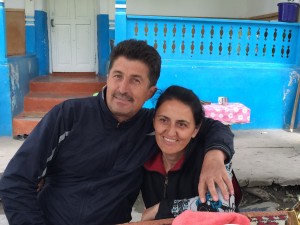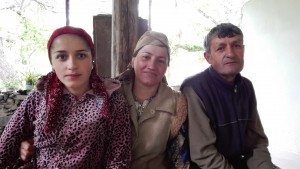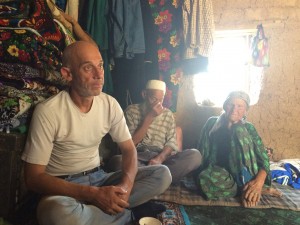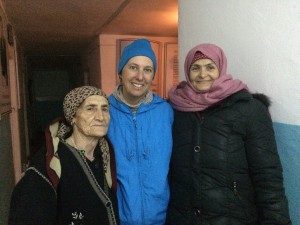“Choi? Chay?”
These Tajik and Russian words will long echo in our ears and our hearts. They are more than an invitation for tea. They are a way into people’s homes and lives. They are reflections of a kind of hospitality people in today’s busy world don’t seem to have time for any more. These words have come to mean “Tajikistan” to us.
Almost every day during this leg of the trip, we have been invited in for tea. And, many days we accepted the offer. Yes, we are thirsty, and could use a few sips of boiled water with green or black tea (many people will ask which one you prefer). But, more importantly, the ceremony of tea here is an outpouring of generosity and an embedded cultural kindness that we have not experienced with such consistency anywhere else we have traveled to date.
Tajik Tea Time, as we call it, has humbled and overwhelmed us. It has left us wondering how we will export these beautiful customs back home and incorporate them into our flavor of hospitality.
It unfolds with a simple question-answer outreach. Tea? Ok. Then the real fanfare begins. We walk down a dirt path, pass the potato and onion plants sprouting out of mineral-rich earth and the open area where the kids are playing. We wash our hands and face (and sometimes our feet, which is also customary) in the stream of cold mountain water flowing through their yards or a family member appears with an elaborate silver container and basin and pours water over our hands and gives us a towel. Thank yous are shared.
We try to hide our dustiness as we shuffle onto a raised platform inside their homes or on the patio’s tea bed, a metal structure lined with body-length cushions and dedicated to lounging around and tea-drinking. Pillows are fluffed and propped behind our backs. A piece of cloth or plastic is laid out in the center as tablecloth.
Large round flatbread called non, sometimes measuring three hands across the diameter, are ripped into smaller pieces and placed in the center of the “table.” A decoratve teapot, small cups, a saucer of giant sugar cubes, a stick of butter, and a serving dish with a variety of candy and chocolates are arranged around the impromptu dining area.
The conversation starts in Russian, Tajik, English, and continues in the universally-understood sign language of smiling and pointing. Names are exchanged and forgotten, the combination of letters and sounds unfamiliar in our ears and theirs. Groundwork is established – we are walking, yes, walking, we are in our 40s, we are a couple and we have no kids, and we are on our way to Uzbekistan next. They are farmers with all sorts of vegetable crops and fruit trees, they are the keepers of cows, goats and sheep, they usually have several children with, typically, one or two of their adult children studying or working in Dushanbe or Moscow.
A bunch of constant surprises follows. Bowls of homemade yogurt, kefir and/or cherry or apricot jam are brought out. A tomato, cucumber, onion and dill salad may pop up, or slices of watermelon or a handful of apricots passed around. Once in a while, fried eggs from the chickens grazing outside the house, soup, fried potatoes, soup, plov (a rice dish with sliced carrots), noodles or pieces of mutton or chicken are placed in front of us. A bowl of fresh, creamy, just-boiled milk is a now-and-again treat, depending on the time of the day and the weather.
The good person who took us in sits with us for a while, usually pouring our first cup of tea, and fans his or her hand across the spread. “Eat” is what the wave indicates. So we do. We fall into their safekeeping and let tea and food bridge our lives.

Waving Off Stranger Danger
In order to receive such goodness, we have had to re-examine our preconceived notions about strangers.
Sadly, we are all bombarded most days with the idea that “those people” are out to get us. They will rob us, hurt us, kidnap us and kill us if they could. Add “stan” to any of the places where “those people” live and the fear around the potential threat multiplies.
Arguably, EVERY place in the world is complex and has its shadow side, and of course, there are inherent dangers living almost anywhere on our planet. But we owe this to ourselves and every other person living on this sweet Earth – we have to stop letting ourselves be tricked into thinking that the world is filled with bad people. It’s just not true.
Yes, I know…There are bad people, and a fair number of them. Unfortunately, they are the ones that keep making headlines, dominating our mind space and convincing us that the world is more unsafe than it has ever been.
But, really, when have you ever read or heard a news story about the amount of tea that generously was offer to complete strangers passing through random spots on a map? Probably never. This may be one of the few stories where you will ever read about such a thing.
Over and over again, we find that that the statements “Most people are good, really good” and “You were strangers before you were friends” carry more weight than all the fear-inducing phrases recklessly thrown out into our mainstream media. Our walk through the Wakhan Valley, the Pamirs and the 750-or-so kilometers we have done through Tajikistan has reinforced that belief.
We are seasoned travelers who have worn out passport pages with the stupid stamps we need to cross borders. I grew up in a tough city where gang violence was and still is a norm. Gut instinct is one of our guiding forces, and we have learned to size up people and situations fairly quickly, thankfully in a way that has kept in out of harm’s way. With all the sincerity I can convey, in the one month we’ve been here so far, there has not been one moment where I ever felt unsafe. In fact, it is one of friendliest places I have been. I hope you come and see for yourself what some people living in “the stans” are like.
Besides one incident with power-hungry officials who love the flawed system they work in (we’re talking about “those people” who dole out completely unnecessary stamps and like to carve out a false sense of control around how people move in the world we all own and belong to), we have been very spoiled in Tajikistan, so much so we don’t even know where to begin in sharing these experiences.
More than once, after the tea invitation, the family extended to us even more kindness, letting us sleep on their tea beds or in their homes, finding even more ways to keep us comfortable and waking up early before we left to serve us more tea and bread, so we could start our day with something in our stomachs.
More than once, when we were too tired to carry on or when a storm was moving in, we knocked on a door and asked if we could pitch our tent in their garden or under their porch roof. They nodded, opened the gate and either let us set up camp or insisted that stay dry and warm inside with their families. One fellow even tucked us in, making sure the blankets covered our feet!
More than once, during Ramadan, the Muslim holy month which this year started in early June, people who are fasting from all food and drink for about 17 hours a day, filled our plates during the afternoon and, after 8 p.m. when they could eat, included us in their families’ evening feast, treating us as one of their own and eager to learn more about us and our lives in Europe. They asked about our work, the kinds of houses people live in and how much visas would cost them with their Tajikistan passports. The young people practiced their English, the third or fourth language they know, told us about the exams they just finished and translated questions and answers between us and their families and friends.
It goes on and on. Day after day of kindness that won’t ever make a headline, except in a blog like this.
Thank you, you beautiful, kind people for your generosity. We were strangers before we were friends, and now you are forever in our hearts.
Repaying Kindness
How can we repay such goodness? Do we even have to? Is a smile and a thank you enough? Should we offer money as compensation?
We struggle with this. Lluís and I are better “givers” than “receivers.” We like helping people, and do that often by giving away our time, our money, our strength and our knowledge. It’s hard for us to accept such humbling kindness and not do something in return.
We are still searching for the balance.
Sometimes, a smile, a thank you, a handshake or a hug is all that’s expected, required and appreciated. We see it in people’s eyes. They gave from their hearts. We honored their gift. We were strangers who were friends, if only for an hour. We momentarily hold each others’ light and then continue with our lives.
Sometimes, especially if we’ve slept in their homes, we offer money. It feels like a dirty thing to do, tainting heartfelt kindness with capitalism, but we know people in Tajikistan do not earn much money and we don’t want to be a burden on them. In the poorer areas, people’s take-home pay may only be $50 – $200 a month, and we hope we can supplement that in a small way. Some families have accepted the money, hesitantly, and we’re glad for that. We know they will find a good way to use it for something they need or want.
Others have refused money, not wanting a single somoni, and insisted that we use it somewhere else on our walk. We watched their expressions change when we tried to pass them some cash, and how they looked at the bills as if it was the absolute evil.
Many who turned down the money were usually the people we thought needed it the most. They gave us everything they had because they wanted to, not because of what they thought we would give back to them.
If these are “those people” we should be afraid of, then I hope to meet many more like them. I can only hope that I will be the one pouring the first cup of choi.












Thank you so much—again—for taking time to share your amazing walk. I am fascinated by the “Stans” and your experiences are making me long to visit even more. You guys are amazing ambassadors of the West. Thank you again. I gobble up every word.
Hello Bonnie!
Thanks-again-for being one of our biggest fans. Sending your light and love into Tajikistan, and sending some of the good vibes we found here back to you.
We hope you visit here one day, and build in time to do at least some of it slowly either by foot or on bicycle. We’re pretty sure that the experience we had in the country, and especially in the Pamirs, would be hard to replicate if we were rushing through in a 4×4. Walking has given us a real taste of the place – from its tea and food to the dust kicked up by trucks and 4WDs passing by.
Beautifully written! What a lovely tradition. I love your sentence about “momentarily holding each other’s light.”
Hi Sunita,
Yes the tea ritual here is both special and normal. When our jaws drop as they bring out more plates, people shrug their shoulders as if to say, “What’s the big deal? It’s just tea.”
Holding each other’s light is something I think a lot about while we walk. Often, I think part of our “walking work” is to serve as “network builders,” meaning that as we pass through villages and meet people we acknowledge each other’s light, share light, leave a little bit of our light behind and carry a little bit of their light with us. I like to think that we’re all connected and that Lluís and I are part of the team doing some of wiring work to hook up all this light that otherwise may be left unseen.
Thanks for following along. We’re adding your light into our pot
Thank you for again pulling back the curtain and letting the light shine in. I had no image of Tajikistan in my mind. Now, I have your stories of kindness. Your Tajikistan is my Tajikistan. Now, I would love to see this beautiful country filled with generous people (except for the visa guy).
Hi Barbara!
Thanks always for your notes and good wishes. I hope you make it to this part of the world one day, and I highly recommend that you do at least part of the Wakhan Valley on foot or by bicycle. We think it would be hard to soak in the goodness that’s all around there if you whiz through in a car.
We also had very little info about this part of the world before we got here, and now are even more curious about it and still have lots to learn. Maybe, curiosity will one day bring us back here. Inshallah! Much love to you and yours.